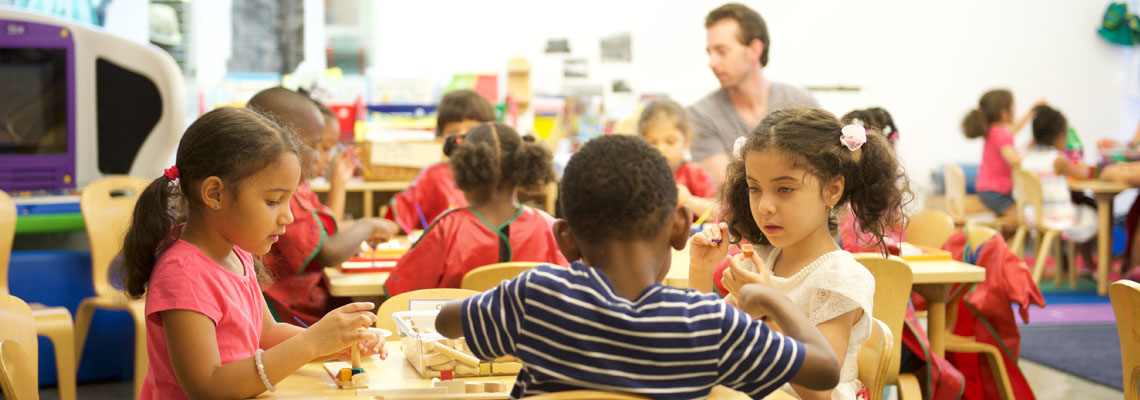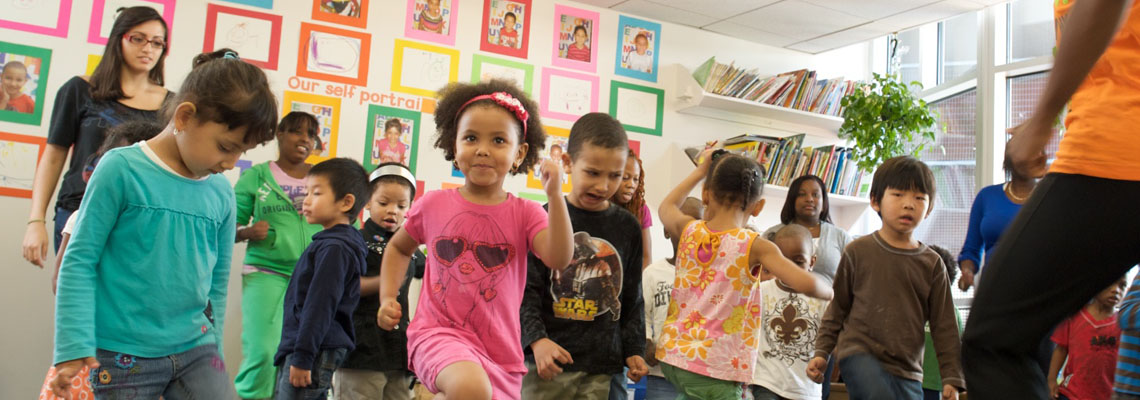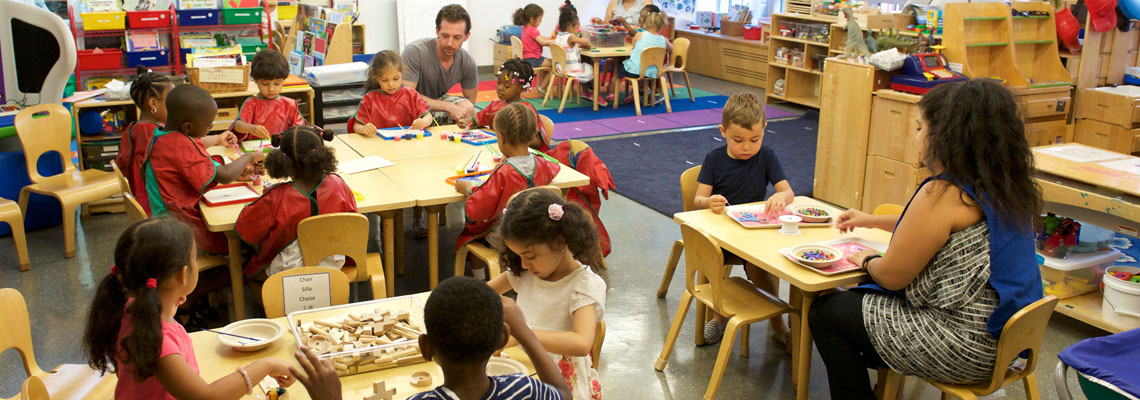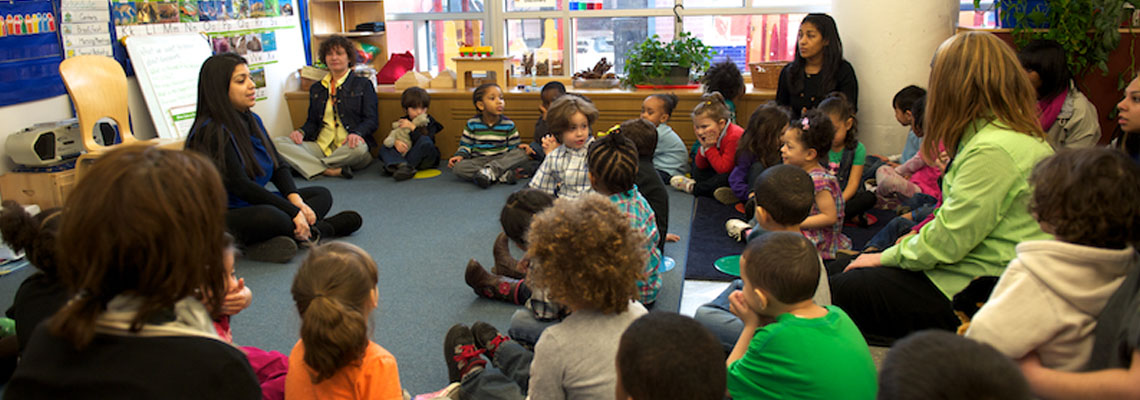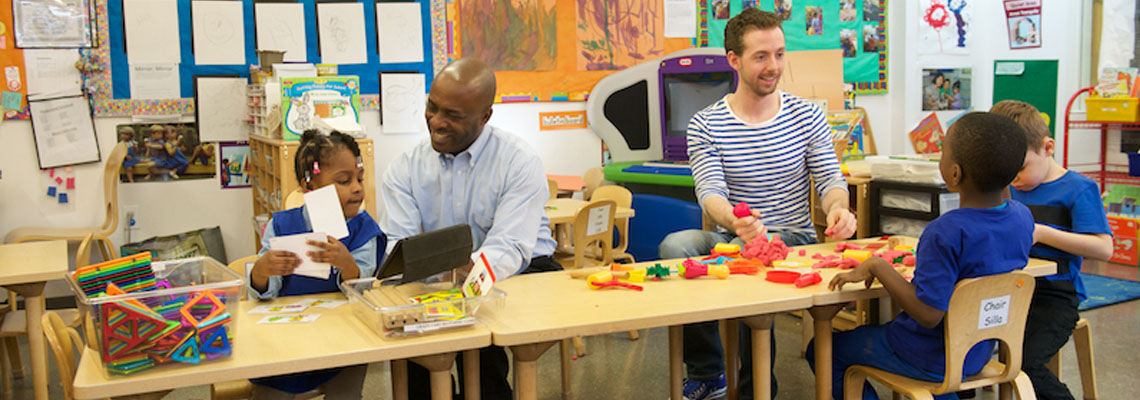Program Coordinator: Professor Jennifer Gilken, jgilken@bmcc.cuny.edu.
The Child Care/Early Childhood Education Program provides a core of Liberal Arts courses as well as specialized courses in child care and early childhood education. The program offers two career areas of study: Infant Toddler and Pre-School/Early Elementary. Coursework in each ECE major includes a progression of ECE courses that cover a wide range of knowledge and skills needed to prepare students to become assistant teachers in childcare, Head Start, nursery and pre-kindergarten programs, and public and private elementary schools.
Explore Careers
BMCC is committed to students’ long-term success and will help you explore professional opportunities. Undecided? No problem. The college offers Career Coach for salary and employment information, job postings and a self-discovery assessment to help students find their academic and career paths. Visit Career Express to make an appointment with an advisor, search for jobs or sign-up for professional development activities with the Center for Career Development. Students can also visit the Office of Internships and Experiential Learning to gain real world experience in preparation for a four-year degree and beyond. These opportunities are available to help BMCC students build a foundation for future success.
Transfer Options
BMCC has articulation agreements with several four year colleges to allow you to seamlessly continue your education there. Students are advised to visit the department to discuss their plans for transferring to a four-year college before choosing their courses.
Evening/Weekend Child Care/Early Childhood Education
In addition, BMCC offers an Associate in Science (A.S.) degree in Child Care/Early Childhood Education with a focus on Preschool and Early Elementary School in an evening/weekend format. Students can complete their degree requirements by attending classes exclusively in the evenings and weekends.
These suggested careers may require bachelor's or higher degrees.
Make an appointment at the Academic Advisement and Transfer Center.
Required Common Core
| English Composition | 6 |
| Mathematical and Quantitative Reasoning1 | 3 |
| Life and Physical Sciences2 | 3 |
| TOTAL REQUIRED COMMON CORE | 12 |
Flexible Core3
| Creative Expression1 | 6 |
| Individual and Society1 | 3 |
| Scientific World1 | 3 |
| U.S. Experience in Its Diversity1 | 3 |
| World Cultures and Global Issues1 | 3 |
| TOTAL FLEXIBLE COMMON CORE | 18 |
| TOTAL COMMON CORE | 30 |
Curriculum Requirements
- This course examines the psychological and psychosocial foundations of early childhood and relates these foundations to educational practice with your children, birth to eight years. It focuses on historical and contemporary theories of childhood development. Early learning is considered in relation to biological factors, child and family factors, program factors and social factors, particularly in diverse urban settings. Young children?s physical, cognitive, communicative, social and emotional development is explored as contributors to and as consequences of early learning experiences. This course requires 15 hours of fieldwork.
- This course provides an overview of the social context of early care and education. It focuses on the historical, philosophical, sociological, and political foundations of programs for young children, birth to eight years. The following topics will be explored in depth: Historical and contemporary theories of early childhood education, multicultural and social ecological factors in early care and schooling, particularly for diverse urban settings; early childhood programming; family and community involvement; advocacy, trends and current issues in early childhood practice. This course requires 30 hours of fieldwork. Prerequisite: Grade of C or better in ECE 110
Infant/Toddler Specialization Requirements
- This course focuses on the theories, methods and materials of early childhood education for infants (birth to 18 months), with emphasis on addressing developmental needs and culturally appropriate practices in their education and care. The following topics are explored in depth: social, emotional, cognitive and physical development of infants; basic principles of infant care giving, including providing culturally sensitive and consistent care; arrangement of the environment and developmentally appropriate experiences to promote infant growth and learning; the role of parents and establishing partnerships with families.
Prerequisite: Grade of C or better in ECE 110 - This is a fieldwork course focusing on the observation and assessment of infants and toddlers. It requires supervised participation in an assigned early childhood education setting (birth to 36 months) and attendance at a weekly seminar. Students will learn the appropriate use of assessment and observation strategies to document the development, growth, play and learning of infants and toddlers; and how authentic assessment methods can be used to tailor curriculum to promote children?s success. Recording strategies, rating systems, child studies/portfolios, and various assessment tools are explored. Students spend a minimum of 60 hours in the field. Prerequisite: Grade of C or better in ECE 209 and ECE 210
- This course is a continuation of ECE 209, focusing on the theories, methods and materials of early childhood education for toddlers (ages 18 months to 36 months). The following topics are explored in-depth: social, emotional, cognitive, physical and self-help development of toddlers; basic principles of toddler caregiving, including providing culturally sensitive and consistent care; arrangement of the learning environment and developmentally and culturally appropriate experiences to promote toddler growth and learning; the role of parents and establishing partnerships with families.
Prerequisite: Grade of C or better in ECE 209 and ECE 210
Course Syllabus - This is a capstone fieldwork course that enables students to demonstrate their competencies teaching infants and toddlers. It requires supervised participation in an assigned early childhood education setting (birth to 36 months) and attendance at a weekly seminar. Students will utilize practical classroom experiences to make connections between theory and practice, develop professional behaviors, and build a comprehensive understanding of children and families. Child centered, play-oriented approaches to teaching, learning and assessment; and knowledge of curriculum content areas will be emphasized as student teachers design, implement and evaluate experiences that promote positive development and learning for infants and toddlers with diverse learning styles and needs. Students spend a minimum of 90 hours in the field. Prerequisite: Grade of C or better in ECE 308 and ECE 309
- This course examines the education of children (birth to 8 years) with special needs, along with the historical, social, cultural, and legal foundations of special education in the U.S. It explores the causes and effects of various exceptionalities, including: emotional, intellectual, physical, visual, auditory, orthopedic, speech and/or language and giftedness. Techniques for differentiated learning and universal design are analyzed; issues of ethno-cultural diversity are explored, including methods for working with the families of children with special needs in respectful non-biased ways. This course requires 25 hours of fieldwork.
Prerequisite: Grade of C or better in ECE 308 and ECE 309 or Grade of C or better in ECE 311 and ECE 312
Course Syllabus
Preschool Specialization Requirements
- This course is an introduction to the theories, methods and materials of curriculum planning in early childhood education (preschool to 2nd grade), with an emphasis on providing developmentally and culturally appropriate learning environments and experiences that encourage creativity in young children. The following topics are explored in depth: the intellectual and emotional importance of fostering creativity, the role of play in learning, the design of effective arts-based learning environments; the role of visual arts, music, movement and language arts/emergent literacy in developing children?s cognitive, social-emotional, physical, language and self-help skills. Course work includes workshops in planning and implementing creative arts experiences for your children.
Prerequisite: Grade of C or better in ECE 110
Course Syllabus - This is a fieldwork course focusing on the observation and assessment of young children. It requires supervised participation in an assigned early childhood education setting (preschool to second grade) and attendance at a weekly seminar. Students will learn the appropriate use of assessment and observation strategies to document the development, growth, play and learning of young children; and how authentic assessment methods can be used to tailor curriculum to promote children?s success. Recording strategies, rating systems, child studies/portfolios, and various assessment tools are explored. Students spend a minimum of 60 hours in the field. Prerequisite: Grade of C or better in ECE 210 and ECE 211
- This course is a continuation of ECE 211, focusing on the theories, methods and materials of curriculum planning in early childhood education (preschool to 2nd grade). The emphasis in this course is on providing developmentally and culturally appropriate learning environments and experiences that encourage foundational social scientific, mathematic and scientific thinking and skills in young children. The following topics are explored in-depth: social studies as a lens by which young children can explore our diverse ethno-cultural society and their place in it; the use of materials and play-based techniques to facilitate ways of constructing everyday mathematical ideas; the creation of environments and experiences that stimulate children?s scientific curiosity and playful exploration of our natural and human-made world; the use of block/construction and cooking experiences for the integration of social studies, mathematics, science, literacy and the arts. Course work includes workshops in planning and implementing inquiry/play-based experiences for young children.
Prerequisite: Grade of C or better in ECE 210 and ECE 211
Course Syllabus - This course examines the education of children (birth to 8 years) with special needs, along with the historical, social, cultural, and legal foundations of special education in the U.S. It explores the causes and effects of various exceptionalities, including: emotional, intellectual, physical, visual, auditory, orthopedic, speech and/or language and giftedness. Techniques for differentiated learning and universal design are analyzed; issues of ethno-cultural diversity are explored, including methods for working with the families of children with special needs in respectful non-biased ways. This course requires 25 hours of fieldwork.
Prerequisite: Grade of C or better in ECE 308 and ECE 309 or Grade of C or better in ECE 311 and ECE 312
Course Syllabus - This is a capstone fieldwork course that enables students to demonstrate their competencies teaching young children. It requires supervised participation in an assigned early childhood education setting (preschool to 2nd grade) and attendance at a weekly seminar. Students will utilize practical classroom experiences to make connections between theory and practice, develop professional behaviors, and build a comprehensive understanding of children and families. Child centered, play-oriented approaches to teaching, learning and assessment; and knowledge of curriculum content areas will be emphasized as student teachers design, implement and evaluate experiences that promote positive development and learning for infants and toddlers with diverse learning styles and needs. Students spend a minimum of 90 hours in the field. Prerequisite: Grade of C or better in ECE 311 and ECE 312
Footnotes
- Consult with an advisor on which courses to take to satisfy these areas.
- These areas can be satisfied by taking a STEM variant.
- No more than two courses in any discipline or interdisciplinary field can be used to satisfy Flexible Core requirements.
Notes
Please note, these requirements are effective the 2019-2020 catalog year. Please check your DegreeWorks account for your specific degree requirements as when you began at BMCC will determine your program requirements.

